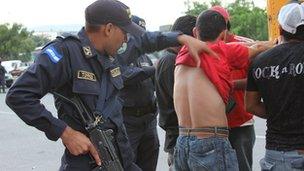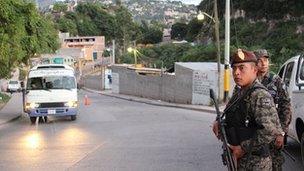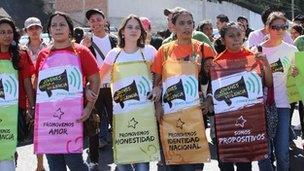Honduras student murders highlight crime concerns
- Published

Operations have been stepped up to counter the high level of violence in Honduras.
It was a Friday night and Alejandro Vargas, a 22-year-old sociology student, was at a dinner party. Around 1am, he left with his friend Carlos Pineda, 24, to go to Carlos's home. They never made it.
Their bodies were found the following day, in a ravine on the outskirts of the capital, Tegucigalpa. Both had been shot several times.
Murders, especially of young men, are common in Honduras. According to the latest report by the UN Office on Drugs and Crime (UNODC), , externalHonduras has the world's highest homicide rate - 82.1 murders per 100,000 inhabitants.
Most killings result from gang fights or the settling of scores among drug traffickers. Half involve young men.
But in the students' case, evidence pointed to a different kind of murder.
Police implicated
Alejandro's DNA was found on a police vehicle. Investigators say private security videos show the same police pick-up truck following Alejandro's car.
Forensic studies suggest the police shot at the car, wounding Alejandro. When the students pulled over, the police killed both men and then dumped their bodies.
"It's a very deep loss," said Julieta Castellanos, Alejandro's mother.
"If one walks down the street and there's a shoot-out and someone dies, it's a tragedy.
"But the tragedy is even bigger when it is the state that causes it, and when the state protects those responsible for the crime."
Eight officers were found to be involved in the killings. Four of them were arrested, but another four took off and are now fugitives.
Ms Castellanos said the police force covered up for them by granting them leave during the investigation.
The killings, which happened in late October, have shaken Honduras.
Maybe it was because Ms Castellanos is not only a victim's mother. As the rector of the National Autonomous University of Honduras, she is also a high-profile figure.
'Operation Lightning'
Within a week of the murders, President Porfirio Lobo sacked his top police commanders. A police unit to which the officers allegedly involved in the murders belonged was dismantled.
Some police officers are under investigation, while others have been reassigned to new areas.
The government has also launched Operation Lightning - bringing in the military to help patrol the streets.

There has been little opposition to the deployment of the Honduran military.
There has been widespread criticism in Latin America of using the military in street operations. In Mexico, where President Felipe Calderon deployed the army five years ago to fight against drug cartels, critics say violence has worsened.
But given documented cases of violence and corruption within the police force in Honduras, there has been little opposition to the army's involvement.
Authorities have said the operation has had immediate success. For several consecutive days, there were no murders in Tegucigalpa, where the waiting room of the main mortuary remained unusually empty.
The difference could also be felt in neighbourhoods like El Infiernito, or Little Hell, one of the most dangerous in the city.
"In this neighbourhood people could not go about their regular business because they were constantly threatened," said Rafael Moreno, an army colonel in charge of Operation Lightning, describing how gangs used to control the territory.
"Armed men would take over the streets and consider anyone a target - they would rob them for their mobiles or any other belonging. They would do so in total freedom."
Checkpoints set up
Military checkpoints have been set up throughout the neighbourhood, and children play outside past sunset, while people walk home from the office.
But this is only a short-lived measure.
"Soldiers are going to be in the streets only temporarily - this is not their role according to the constitution," said Security Minister Pompeyo Bonilla.
"But right now we do need them."
Mr Bonilla said the country's number one priority was to purge the police force. He believed 1,000 officers out of a force of 14,500 were corrupt.
"I think a criminal without power is less dangerous than a criminal with power and a uniform," he said.
Drug cartels
No direct connection has been made between the police officers involved in the students' murders and drug traffickers.
It is, however, believed that cartels have infiltrated the police force, making it hard for the Honduran government to know who to trust with the country's delicate security situation.
As authorities fight drug cartels along well-known trafficking routes, new routes have opened up across Central America, causing rising violence in Honduras, El Salvador and Guatemala.
Many believe violence in Honduras worsened in 2009 after President Manuel Zelaya was forced from office.

Protests are growing against the violence and police corruption.
With half of the population living below the poverty line, and authorities busy with a political crisis, Honduras quickly became one of the main landing points for South American cocaine.
"An institutional battle, a military coup, and ongoing complications about the international recognition of Honduras's government have dissuaded the aid and co-operation believed necessary to fight organised crime," said James Bosworth, a security expert, in an article for the Woodrow Wilson International Centre for Scholars. , external
This climate of violence has not stopped Ms Castellanos, who said she would continue to push for institutional change.
Among other initiatives, she has led several marches against violence and to highlight police corruption.
"I believe we reached this point because of people's fear. We reached a point where the police felt they could do anything they wanted.
"This is not the country we deserve."
- Published1 November 2011
- Published21 August 2011
- Published7 July 2011
- Published17 March 2011
- Published28 February 2011
- Published23 January 2011